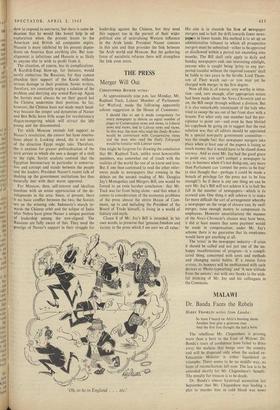THE PRESS Merger Will Out
CHRISTOPHER BOOKER writes:
At approximately nine p.m. last Monday, Mr.
Raphael Tuck, Labour Member of Parliament for Watford, made the following apparently
One might be forgiven for drawing the conclusion that Mr. Raphael Tuck, unlike most honourable members, was somewhat out of touch with the realities of the world the rest of us know and love. But if one then continued to read the other refer- ences made to newspapers that evening in the debate on the second reading of Mr. Douglas Jay's Monopolies and Mergers Bill, one would be forced to an even harsher conclusion : that Mr. Tuck was far from being alone—and that when it comes to consideration of the economic problems of the press almost the entire House of Com- mons, up to and including the President of the Board of Trade himself, is living in a world of fantasy and myth.
Clause 8 of Mr. Jay's Bill is intended, in his own words, to preserve that 'genuine freedom and variety in the press which I am sure we all value.'
'Oh, to be in England . . . etc.'
His aim is to staunch the flow of newspaper mergers and to halt the drift towards fewer news- papers in fewer hands. His method is to set up an administrative tribunal to which all prospective mergers must be submitted—either to be approved or disallowed within a period not exceeding nine months. The Bill shall only apply to daily and Sunday newspapers and, one interesting sidelight, anyone who is caught being 'privy to any pur- ported transfer without the required consent' shall be liable to two years in the Scrubs. Lord Thom- son of Fleet watch out—or you may yet be charged with merger in the first degree.
Now all this is, of course, very worthy in inten- tion—and, sure enough, after appropriate noises had been made about the News Chronicle and so on, the Bill swept through without a division. But it is also remarkably reminiscent of the lady who tried to sweep the sea out of her front door with a broom. For what only one member had the per- cipience to point out—and even he then blotted his copybook by going on to suggest that the real solution was that all editors should be appointed by a special non-party government committee— was the simple fact that newspaper mergers take place when at least one of the papers is losing so much money that it would have to be closed down anyway. And as even Mr. Jay had the good grace to point out, you can't compel a newspaper to stay in business when it's not doing any, any more than Parliament can 'compel the press to be free' (a nice thought that—perhaps it could be made a breach of privilege for the press not to be free enough?). So if there is any one thing we can be sure Mr. Jay's Bill will not achieve it is to halt the fall in the number of newspapers—which is its avowed aim. One thing it will achieve is to make far more difficult the sort of arrangement whereby a newspaper on the verge of closure can, by swift merger, raise enough money to compensate its employees. However unsatisfactory the manner of the News Chronicle's closure may have been, it did at least ensure that some payment would be made in compensation; under Mr. Jay's scheme there is no guarantee that its employees would have got anything at all.
The 'crisis' in the newspaper industry—if crisis it should be called and not just one of the un- happy manifestations of progress—is a compli- cated thing, concerned with costs and methods and changing social habits. If a rescue force arrives, its banners will be emblazoned with such devices as 'Photo-typesetting' and 'A new attitude from the unions'; not with any thanks to the wish- ful thinking of Mr. Jay and his colleagues in the Commons.






































 Previous page
Previous page